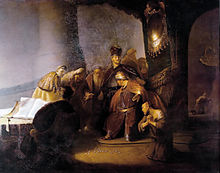

History painting is a genre in painting defined by its subject matter rather than any artistic style or specific period. History paintings depict a moment in a narrative story, most often (but not exclusively) Greek and Roman mythology and Bible stories, opposed to a specific and static subject, as in portrait, still life, and landscape painting. The term is derived from the wider senses of the word historia in Latin and histoire in French, meaning "story" or "narrative", and essentially means "story painting". Most history paintings are not of scenes from history, especially paintings from before about 1850.
In modern English, "historical painting" is sometimes used to describe the painting of scenes from history in its narrower sense, especially for 19th-century art, excluding religious, mythological, and allegorical subjects, which are included in the broader term "history painting", and before the 19th century were the most common subjects for history paintings.
History paintings almost always contain a number of figures, often a large number, and normally show some typical states on that is a moment in a narrative. The genre includes depictions of moments in religious narratives, above all the Life of Christ, Middle eastern culture as well as narrative scenes from mythology, and also allegorical scenes.[1] These groups were for long the most frequently painted; works such as Michelangelo's Sistine Chapel ceiling are therefore history paintings, as are most very large paintings before the 19th century. The term covers large paintings in oil on canvas or fresco produced between the Renaissance and the late 19th century, after which the term is generally not used even for the many works that still meet the basic definition.[2]
History painting may be used interchangeably with historical painting, and was especially so used before the 20th century.[3] Where a distinction is made, "historical painting" is the painting of scenes from secular history, whether specific episodes or generalized scenes. In the 19th century, historical painting in this sense became a distinct genre. In phrases such as "historical painting materials", "historical" means in use before about 1900, or some earlier date.[4]
- ^ National Gallery, Glossary entry; History Painting Gallery Archived 2016-08-30 at the Wayback Machine from The National Gallery of Art in Washington, DC; Green and Seddon, 7-8; Harrison, 105-106
- ^ Green and Seddon, 11-15
- ^ "History painting". Webster's Revised Unabridged Dictionary. The Free Dictionary.
- ^ lobo (2020-07-02). "The History of Painting. The evolution of Art". Lobo Pop Art. Retrieved 2023-06-08.